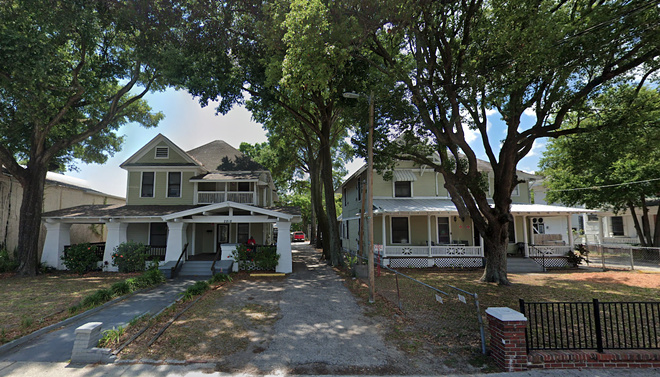
Photo via Google Maps
Tampa Police Detective Sergeant Greg Van Heyst presented TPD’s six-page report, showing three locations for rooming houses in Tampa, Florida.
Kim Headland, V.M. Ybor Neighborhood Association president and longtime resident, has been asking the city to pay attention to the growing number of sex offenders for years now.
“The City of Tampa has one offender for every 300 residents, we have one for every 29 residents,” Headland said at the meeting last month. “It’s a systemic and deliberate release of individuals to just three locations.”
Detective Sergeant Greg Van Heyst presented TPD’s six-page report, showing three locations for rooming houses: 2818 N Nebraska Ave., 2820 N Nebraska Ave., and 2821 N Nebraska Ave. All three locations are “rooming houses” for sex offenders and account for 57 offenders, or roughly 7% of the city’s offender population, in a half-mile area. Out of the city’s 844 offenders, 42% live in District 3, where V.M. Ybor is located. There is a county anti-clustering ordinance in effect in Hillsborough but residents say it’s not being enforced.
The report was requested in a motion from former Tampa City Councilman John Dingfelder and current council chair Guido Maniscalco on Aug. 5, 2021. Originally slated for Oct. 21, 2021, TPD didn’t report until Oct. 19, 2023.
Some from the parolee community came to speak about the importance of housing to their recovery. Eddie Fordham was sentenced to life in prison and paroled last year after 31 years. The transition home he moved into in Jackson Heights was crucial to his recovery, which now includes a college education and steady employment.
“I understand there’s a clustering issue in Tampa,” Fordham said at the meeting. “But where these people are registered, they receive the services they need.”
Several residents raised concerns about overcrowding in the offender housing, noting that the numbers violated the city’s fire code cap of 16 people per building. According to Tampa’s Assistant City Attorney Mike Schmid, the state’s fire marshal advised Tampa that there was “latitude” in the code allowing for additional occupancy.
“It turned out that 30 people [in one location] are allowed, and that was legal,” Schmid said at the meeting. “It was determined there was no violation.”
For some nearby residents, the concentration of offenders feels deliberate.
“It’s a mini penal colony,” Kelly Grimsdale, V.M. Ybor resident, said at the meeting.
In addition to TPD’s report to the council, USF Criminology professor Dr. Bryanna Fox, Ph.D., presented a study on whether Sex Offender Registration & Notification or SORN restrictions reduce sex offending in Tampa. Fox is co-director at USF’s Center for Justice, Research, and Policy. Florida saw SORN rolled out in October 1997 to prevent recidivism through increased offender tracking and restrictions as part of the national SORN registry.
“SORN and other related policies do not appear to reduce or prevent crime statistically,” Fox said at the meeting. “Housing restrictions appear to be a barrier to successful re-entry, with increased likelihood of recidivism.”
For Brian Edwards, an offender that has been in a wheelchair since 1985, he was released in 2016 and dropped off on the side of the road when law enforcement couldn’t place him anywhere.
“I was arrested again in 2019 for failure to register,” Edwards said at the meeting. “And when I got out in 2021, I went right back to the same side of the road.”
Florida’s housing crisis has struck the sex offender community, with very few places to go after release that meet the state’s restrictions.
“Don’t nobody want it in their backyard,” Connie Burton, community activist and resident, said at the meeting. “But people got to have somewhere to live.”
The controversy over housing sex offenders is nothing new for Tampeños. In 2005, 2006, and 2007, Tampa’s City Council reportedly tried to ban sex offenders from moving to the city using restrictions of 2,500 feet around prohibited areas. That exceeds the state’s 1,000-foot ban around schools, daycares, and playgrounds. Tampa had hoped to follow Miami Beach’s 2005 comprehensive ban on sex offenders covering almost the entire city.
Ultimately, Tampa was advised against the ban by its legal counsel because it would be challenged as unconstitutional. Miami’s ban was challenged by the ACLU in 2018, but upper courts upheld the ban.
Councilmember Lynn Hurtak’s motion for a workshop between concerned parties on clustering sex offenders passed unanimously. The workshop will include representatives from the city’s real estate, housing, code enforcement departments, TPD, Dr. Fox, reentry service liaisons, and someone from the Department of Corrections.
“It’s a brainstorming session,” Hurtak said at the meeting. “We don’t expect anyone to come with answers.”
Headland told Creative Loafing Tampa Bay that the report from TPD left her with additional questions that needed to be answered. She hopes the workshop will bring that information to light.
“The best takeaway is that there’s an opportunity for a workshop at the end of November,” Headland told CL. “We’re hopeful that maybe some additional folks in the room mean there’s a chance to look at things in a little bit more of a holistic manner.”
The workshop is scheduled for Nov. 30.
Subscribe to Creative Loafing newsletters.
Follow us: Apple News | Google News | NewsBreak | Reddit | Instagram | Facebook | Twitter | Or sign up for our RSS Feed

